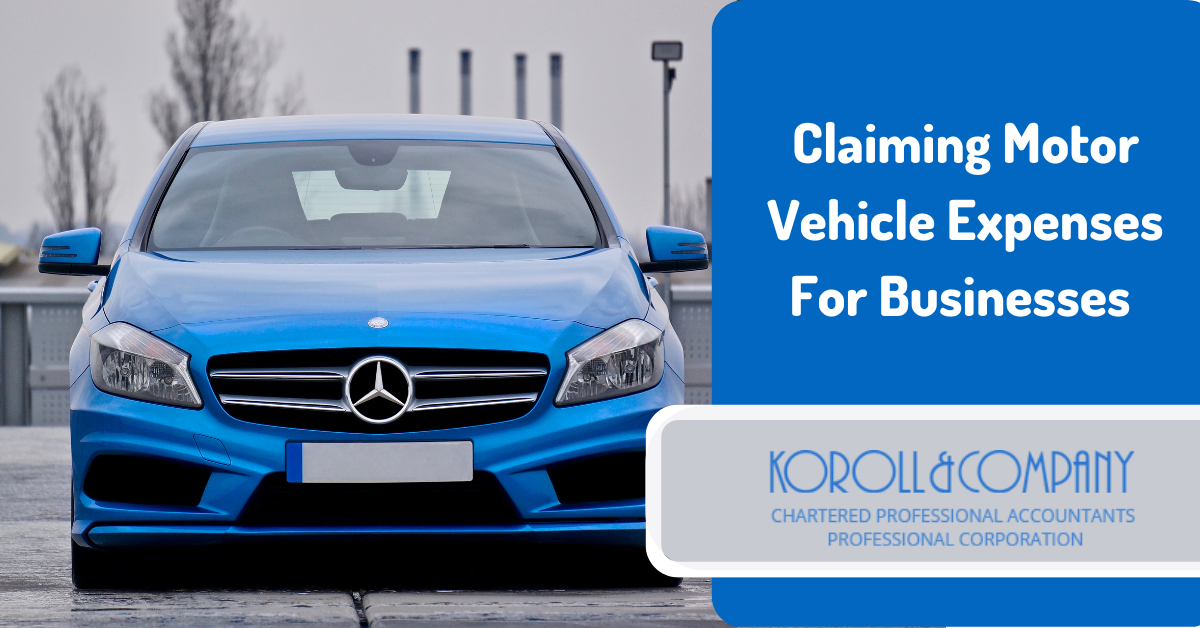 When you use a vehicle for business purposes, you can deduct some or all the expenses from your business income.
When you use a vehicle for business purposes, you can deduct some or all the expenses from your business income.
The percentage you claim will depend on what percentage of the vehicle use is used to earn income. For example, if you drive the vehicle 50% of the time to run a personal errand and 50% to earn business income, you can claim 50% of the expenses.
But before you start claiming motor vehicle expenses, here’s what you need to know:
Logbooks
If you are using your vehicle for personal and business purposes, it is important to maintain a logbook. This will support your business use of the vehicle claim by recording accurate records of all business travel including:
- Date
- Destination
- Reason for the trip
- Distance covered in kms
You will also have to record the odometer reading on your vehicle at the beginning and end of each fiscal year. This will allow you to determine what portion of your kilometers driven were for business.
Business Use Of Vehicle = km driven for business / total km driven in the year x 100
NOTE: You can maintain a logbook for one complete year to establish a base year. For any year thereafter, you can maintain a three-month logbook to represent the entire year, so long as the percentage is within 10% of the base year. Once the year is complete, you will use the following equation.
Business Use Of Vehicle = (Sample Year Period % ÷ Base Year Period %) × Base Year Annual %
If the sample amount differs by more than 10% of the previous year, you would need to maintain a full year logbook.
Receipts
In addition to maintaining a logbook, you can only deduct vehicle expenses when they are reasonable and when you have receipts to support the expense.
This makes it important to keep every receipt related to your vehicle. This includes repair and maintenance receipts, gas and oil receipts and even insurance invoices. To help ensure nothing gets misplaced, keep an envelope or folder in your vehicle and place your receipts in it as you get them.
Type of vehicle
The type of vehicle you use for business purposes can also affect the expenses you deduct from business income. For example, if you own a zero-emission passenger vehicle, there may be limits on what you can deduct for CCA, interest and leasing costs. That is why it is important to know the following definitions:
Motor vehicle: A vehicle for use on highways and streets, excluding a trolley bus or vehicles that operate only on rails.
Passenger vehicle: A vehicle for use on highways and streets that is owned or leased by the taxpayer that is not a zero-emission vehicle and can seat a driver and eight passengers or less. This includes most cars, vans, trucks and station wagons.
The amount of CCA, interest and leasing costs that can be deducted for a passenger vehicle are limited.
There are some exceptions to the passenger vehicle inclusion. This includes ambulances, marked police/fire/medical services vehicles, vehicles used more than 50% of the time as taxis, buses that transport passengers, funeral hearses, other funeral vehicles used to transport passengers, vehicles specifically bought to rent/sell/lease.
In addition, a passenger vehicle does not include:
A van, pick up truck or similar vehicle that:
- Seats no more than three people including the driver and was used more than 50% of the time to transport goods and equipment in the year it was bought to earn business income.
- Was used more than 90% of the time to transport goods and equipment in the year it was bought to earn business income.
Or a pickup truck that was used more than 50% of the time to transport goods, equipment or passengers in the year it was bought to earn business income from a remote work site or a work site that is 30+ km away from the nearest community of 40,000 or more people.
Zero Emission Vehicle (ZEV): A vehicle that is:
- Owned by the taxpayer
- A plug-in hybrid with a 7+ kWh capacity battery, fully electric OR fully hydrogen powered
- Acquired and available for use after March 18, 2019
- Not used or acquired for use for any purpose before the taxpayer acquired it
- A vehicle that has not had CCA or terminal loss deductions claimed by another person
Zero Emission Passenger Vehicle (ZEPV): A vehicle in Class 54, which would otherwise be in Class 10 or 10.1, that is owned by the taxpayer. The same rules apply to a ZEVP that apply to a regular passenger vehicle.
NOTE: A ZEPV can’t be leased but other vehicles that would otherwise qualify as a ZEPV if owned by the taxpayer are restricted by passenger vehicle deduction restrictions. =
For more information on how the type of vehicle affects your claim, visit the CRA website.
Deductible expenses
The following expenses can be claimed as motor vehicle expenses for your business:
- License and registration fees
- Fuel and oil costs
- Electricity costs for zero-emission vehicles
- Insurance
- Interest on money borrowed to buy a motor vehicle
- Maintenance and repairs
- Leasing costs
Please remember that the amount of CCA, interest and leasing costs that can be deducted for a passenger vehicle are limited. You may also claim capital cost allowances on motor vehicles.
For more information on claiming motor vehicle expenses and what you can do to make the most of your deduction before year end, contact us today.






